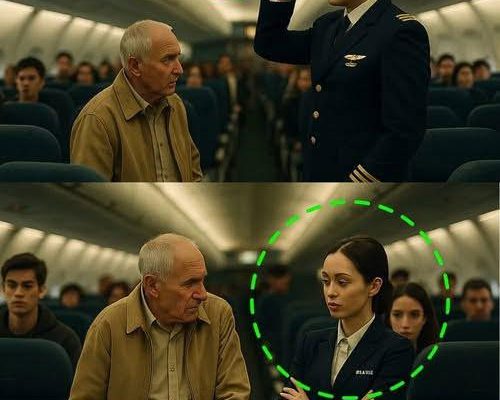“Sir, I need you to reallocate to seat 32B,” the flight attendant said, her voice clipped but controlled, as though this was just another routine adjustment. She wore the practiced smile of someone trained to handle hundreds of people a day, but beneath it, there was urgency. “We have a family that needs to sit together, and your seat is the only one available.”
The man, perhaps in his late 60s, lifted his eyes slowly. He looked down at his boarding pass again—12C. Aisle seat. Extra legroom. The seat he had reserved nearly four months ago. Not for luxury or convenience, but necessity. His right knee, shattered during his final deployment, didn’t bend easily, and long flights without aisle access were brutal.
“I booked this seat for medical reasons,” he said softly, not wanting to escalate things. He wasn’t one for confrontation. His voice was calm, laced with quiet resolve, not defiance.
But the flight attendant didn’t back down. Her expression tightened, and the kindness faded into impatience. “I understand, sir. But if you don’t reallocate, we can’t seat the family, and that holds up the entire flight. We’re on a tight schedule.”
Passengers nearby began to fidget, craning necks and whispering. The row behind him started muttering about delays. Somewhere in the back, a toddler started to cry. Nine minutes passed.
Nine minutes of discomfort, of pressure, of a man trying to maintain dignity in the face of bureaucracy.
He didn’t want to be the problem. He’d spent his life fixing problems—risking everything to protect others. But now, the system he once served seemed to ask him to yield, again, without understanding his needs.
Then the cockpit door opened.
The murmur of the cabin quieted. Heads turned. Out stepped the captain—a tall man in his forties, confident but approachable. He walked down the aisle without hesitation and knelt beside the older gentleman.
“I heard there’s an issue,” he said.
The man explained everything in a few short sentences: the injury, the importance of the seat, the months of planning. The captain didn’t interrupt. He just listened.
And then, without asking anyone’s permission, the captain stood and said, “You’ll take my jump seat. Up front. Closest to the aisle. It’s yours.”
There was a pause—a breath of collective silence that rippled through the plane.
“No one who’s served,” the captain said, loud enough for all to hear, “should be asked to give up what they need. Not on my flight.”
The flight attendant, caught off guard, stepped back and nodded silently. The man blinked, stunned, and then slowly rose, a limp in his step. He passed down the aisle, past passengers who now avoided his eyes out of shame, others who smiled softly in recognition.
As he disappeared toward the cockpit, someone started clapping. Not loud or showy—just a slow, steady applause. Then another joined. And another. Soon the cabin echoed with it.
It wasn’t about a seat anymore.
It was about respect. About recognition. About leadership that didn’t wait for permission to do the right thing.
And in that moment, a cramped cabin full of strangers became something else entirely—a place where a quiet man’s sacrifice was finally acknowledged. Where an ordinary flight became a memory no one on board would forget.
When the plane landed hours later, the man was the last off. The captain stood beside him, and passengers nodded, smiled, even said thank you.
Because sometimes, the way we treat each other—especially when no one is watching—is the true measure of who we are.



